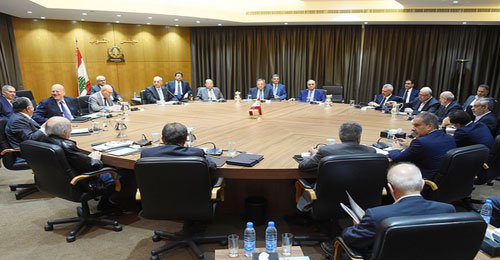By Joseph A. Kechichian

Beirut: Although Speaker Nabih Berri insisted that reaching an
agreement on a new electoral legislation would allow Lebanon to end a
lingering presidential vacuum, his 19th convocation of the National
Dialogue failed to produce a new initiative, though everyone planned to
revisit pending concerns at a later date.
On Tuesday, rival
leaders returned to the Speaker’s mansion at Ain Al Tineh, even if March
8 and March 14 politicians harboured low expectations for reaching an
accord. Berri’s proposal for a new voting system called for holding
early parliamentary polls before the election of a president.
Siniora’s stand Former
Prime Minister Fouad Siniora, who represented the Future Movement at
the National Dialogue sessions, renewed his party’s insistence for the
election of a president first to end the current paralysis. He and
others rejected any tampering with the Constitution.
A joint
parliamentary committee has been meeting periodically but it too was
unable to settle the issue and agree on an alternative to the so called
1960 law, which called for electoral districts to be based on the qadas,
or constituents, formula. It is scheduled to meet again on Wednesday,
that is 24 hours after the 19th National Dialogue session, though many
doubted lawmakers displayed any abilities to agree on a new voting
system.
For months on end, Lebanese officials examined two hybrid proposals
that called for a proportional voting system as well as the present
winner-take-all formula. The Speaker’s proposal was pitted against one
backed by the Future Movement, the Lebanese Forces and the Progressive
Socialist Party (PSP).
On Tuesday, Kataeb Party leader Sami
Gemayel repeated his calls for Lebanon to be divided into single
constituencies as well as for the implementation of the Ta’if Accords
that planned the creation of a senate. These, Gemayel claimed, would
gradually abolish the sectarian system in the country and build
confidence among an increasingly disillusioned population.
Free
Patriotic Movement leader Michel Aoun, PSP chief Walid Jumblatt and
Lebanese Democratic Party head Talal Arslan were absent from the 19th
dialogue meeting. So was Robert Fadel, the Tripoli deputy who resigned
after municipal elections shattered his legacy, when the Minister of
Justice Ashraf Rifi’s list prevailed.
Lebanon’s offshore oil and
gas reserves question was apparently also discussed on Tuesday, though
no details were revealed about any decisions reached, if any.



